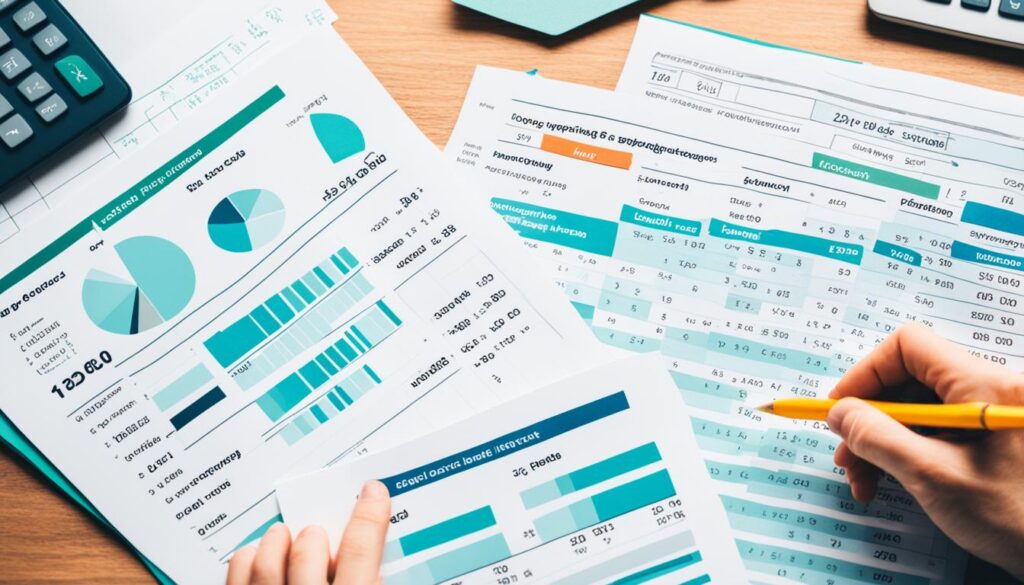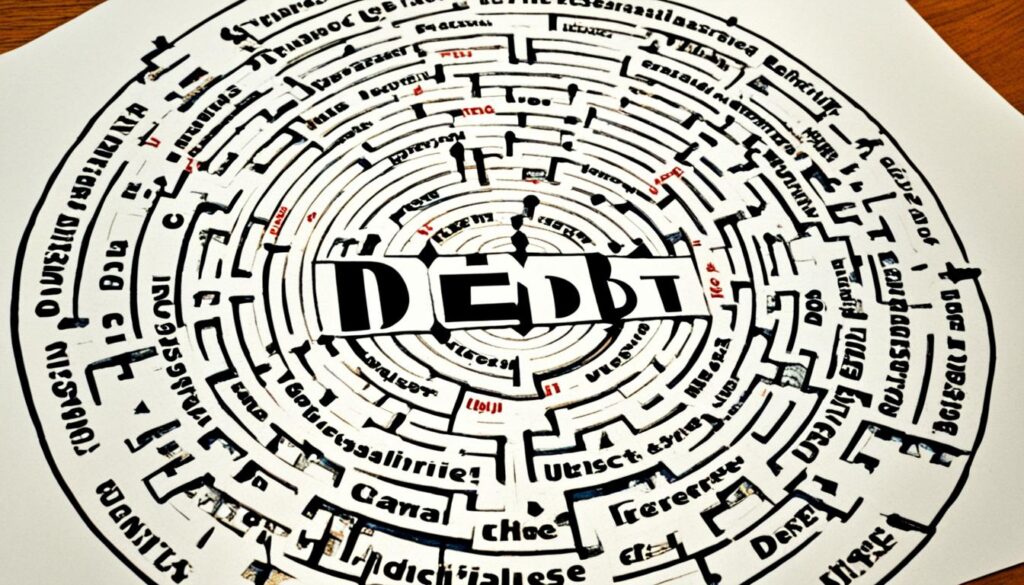Are you tired of living under the weight of debt? Do you dream of achieving financial freedom? If so, then zero-based budgeting might just be the solution you’ve been searching for. This powerful strategy for debt elimination and management will help you take control of your finances and pave the way towards a debt-free future.
Imagine this: Meet Sarah, a hardworking professional who found herself drowning in debt. Every month, she struggled to make minimum payments, never seeming to make a dent in her balances. The stress and anxiety weighed heavily on her, leaving her feeling trapped and hopeless.
One day, Sarah stumbled upon the concept of zero-based budgeting. Intrigued, she decided to give it a try. She started by meticulously tracking her income and expenses and was shocked to discover how much money was slipping through her fingers.
With renewed determination, Sarah created a zero-based budget, assigning every dollar a purpose. She became intentional with her spending, cutting back on unnecessary expenses and redirecting the money towards debt repayment. The results were astounding.
Within just a few months, Sarah started seeing a significant decrease in her debt. The feeling of progress and control that came with each payment was exhilarating. No longer burdened by debt, Sarah was able to save more, invest in herself, and truly enjoy life.
Zer-based budgeting had not only helped Sarah pay off her debts but also empowered her to take control of her financial future. She no longer felt helpless or overwhelmed by money matters. Instead, she had a clear plan, a roadmap to financial freedom.
If Sarah could do it, so can you. By implementing zero-based budgeting, you too can master debt payoff and pave the way towards a brighter, debt-free future.
Key Takeaways:
- Zero-based budgeting is a powerful strategy for efficient debt elimination and management.
- It involves assigning a purpose for every dollar earned, including debt payments and savings.
- By giving each dollar a job and aiming to end the month with zero, this budgeting method maximizes the money available for debt payoff.
- Zero-based budgeting requires discipline, tracking of expenses, and regular adjustments.
- Implementing zero-based budgeting can help you take control of your finances and unlock the path to financial freedom.
How Zero-Based Budgeting Works
Zero-based budgeting is a powerful strategy for efficient debt elimination and management. It involves creating a budget where every dollar earned is allocated to specific expenses, savings, and debt payments.
By giving each dollar a job and aiming to end the month with zero, this budgeting method maximizes the money available for debt payoff. It can be implemented using simple tools like pen and paper or spreadsheets, making it accessible to everyone.
With zero-based budgeting, each month’s budget is based on the previous month’s income and expenses. By using actual income and not projections, this method ensures that the budget is realistic and aligns with one’s financial situation.
It involves assigning a purpose for every dollar earned, including debt payments and savings. The objective is to end the month with zero or a small buffer in the checking account.
This approach allows individuals to prioritize debt payoff and eliminate wasteful spending.
Implementing zero-based budgeting requires careful planning and commitment.
Real-Life Example of Zero-Based Budgeting
To understand how zero-based budgeting works in practice, let’s consider the example of the Martins, a fictional family. They tracked their income and expenses for a month and discovered that they were spending more than they earned.
With zero-based budgeting, they revised their spending plan for the next month, reallocating funds from non-essential categories to debt payments. By making adjustments and prioritizing debt reduction, they were able to triple their monthly debt payments and make significant progress towards becoming debt-free.

Tips for Using Zero-Based Budgeting to Pay Down Debt
Successfully using zero-based budgeting to pay down debt requires discipline, patience, and follow-through. Here are some tips to make your zero-based budget more effective for debt payoff:
- Track your expenses: Monitor your spending habits to identify areas where you can cut back and allocate more funds towards debt repayment.
- Set realistic goals: Establish clear and achievable objectives for paying off your debt. Break down larger goals into smaller milestones to stay motivated.
- Trim unnecessary expenses: Evaluate your budget and eliminate non-essential spending. Consider reducing dining out, entertainment subscriptions, or luxury purchases to free up more money for debt payments.
- Increase your income: Explore additional sources of income to accelerate your debt payoff plan. Take on a side gig or freelancing opportunities to generate extra cash.
- Negotiate interest rates: Contact your creditors to negotiate lower interest rates on your debts. This can save you money and help you pay off your debt faster.
- Automate your payments: Set up automatic payments towards your debt each month to ensure consistency and avoid late fees.
- Seek professional advice: Consider consulting with a financial advisor or credit counselor for personalized guidance on how to optimize your zero-based budget for debt payoff.
By implementing these tips, you can enhance the effectiveness of zero-based budgeting in your debt reduction journey. Remember, consistency and perseverance are key to achieving your financial goals.

The Benefits of Zero-Based Budgeting
Zero-based budgeting offers several benefits for individuals striving to pay off debt and achieve financial freedom. Some of the key advantages include:
1. Greater Control and Clarity
Zero-based budgeting provides a clear picture of where your money is going and allows you to take control of your finances. By assigning every dollar a purpose, you can prioritize debt payoff and avoid unnecessary expenses, helping you stay on track towards your financial goals.
2. Debt Reduction and Faster Payoff
With zero-based budgeting, you can allocate more money towards debt payments, accelerating your debt payoff journey. By eliminating wasteful spending and making intentional choices with your money, you can make significant progress in reducing your debt and ultimately becoming debt-free.
3. Improved Spending Habits
Zero-based budgeting forces you to evaluate your spending habits and make intentional choices about where your money goes. By tracking and categorizing your expenses, you can identify areas where you may be overspending and make adjustments to align with your financial goals.
4. Building Emergency Savings
By budgeting down to zero every month, zero-based budgeting helps you create room for emergency savings. Allocating a portion of your income to an emergency fund ensures that you have a financial safety net to rely on when unexpected expenses arise, preventing you from relying on credit cards or taking on additional debt.
5. Better Financial Decision Making
Zero-based budgeting encourages thoughtful financial decision making by requiring you to prioritize your expenses and make intentional choices about how you use your money. It helps you develop better financial habits and builds a solid foundation for long-term financial success.
Implementing a zero-based budgeting system can transform your financial life, enabling you to take control of your debt and create a path towards financial freedom. By prioritizing debt payoff, eliminating wasteful spending, and making intentional choices with your money, you can achieve your financial goals and build a brighter financial future.
How to Implement Zero-Based Budgeting
Implementing zero-based budgeting requires careful planning and commitment. By following the steps outlined below, you can effectively create a debt elimination plan and take control of your finances.
Step 1: Assess your current financial situation
Start by evaluating your income, expenses, and debt. Take into account all sources of income and list your monthly expenses, including fixed and variable costs. This assessment will give you a clear picture of your financial standing and help you identify areas where you can reduce expenses.
Step 2: Set debt payoff goals
Establish measurable and achievable goals for paying off your debt. Determine how much debt you want to eliminate within a specific timeframe and break it down into smaller milestones. Setting realistic goals will help you stay motivated and track your progress.
Step 3: Create a comprehensive budget
Design a zero-based budget that accounts for every dollar of your income. Allocate funds to cover necessary expenses, debt payments, and savings. Prioritize debt repayment by ensuring that a significant portion of your budget is dedicated to paying off your debts.
Step 4: Track your expenses
Monitor your spending closely and track every expense. Use a budgeting app or spreadsheet to record your expenditures and compare them against your allocated budget. This will help you identify areas where you can cut back and redirect more funds towards debt repayment.
Step 5: Make adjustments as needed
Review your budget regularly and make adjustments based on changes in income or expenses. As you pay off debts, consider redirecting those funds towards additional debt payments or savings. Be flexible and adapt your budget as your financial situation improves.
Step 6: Seek professional assistance if necessary
If you find it challenging to create or follow a zero-based budget, consider consulting with a financial advisor or credit counselor. These professionals can provide guidance and offer tailored strategies to help you effectively implement zero-based budgeting and achieve your debt payoff goals.
By incorporating these steps into your financial routine, you can successfully implement zero-based budgeting and create a solid plan for debt repayment.
| Expense Category | Budgeted Amount | Actual Expense |
|---|---|---|
| Housing (Rent/Mortgage) | $1,200 | $1,200 |
| Utilities | $200 | $190 |
| Transportation | $300 | $300 |
| Groceries | $300 | $280 |
| Dining Out | $100 | $80 |
| Debt Payments | $500 | $500 |
| Savings | $100 | $0 |
| Entertainment | $50 | $40 |
How Can Zero-Based Budgeting Help in Effective Debt Reduction Strategies?
Zero-based budgeting can be a powerful tool in creating effective debt reduction strategies for financial freedom. By scrutinizing every dollar spent, it helps identify unnecessary expenses and allocate more funds towards debt repayment. This method allows for a clear and structured approach to managing finances and reducing debt efficiently.
How Can Zero-Based Budgeting Help with Balancing Emergency Fund and Debt Repayment?
Zero-based budgeting can be a helpful tool for managing emergency fund and debt. By assigning every dollar a specific purpose, it ensures that you are prioritizing your financial goals, such as building up your emergency fund while also making progress on debt repayment. This method promotes balance and intentionality.
Conclusion
Zero-based budgeting is a powerful tool for debt payoff and financial management. By implementing this strategy, individuals can assign a purpose to every dollar earned and prioritize debt repayment, making significant progress towards becoming debt-free. While it requires discipline, tracking of expenses, and regular adjustments, the benefits of zero-based budgeting are well worth the effort.
With zero-based budgeting, individuals have a clear plan for their money, ensuring that every dollar is working towards their financial goals. It eliminates wasteful spending and allows for better control over personal finances. By allocating funds towards debt repayment, individuals can accelerate their journey towards financial freedom.
If you are struggling with debt and looking for an effective debt payoff strategy, consider implementing zero-based budgeting. By following a disciplined approach and regularly reviewing your budget, you can stay on track and make significant progress towards eliminating your debts. Take control of your finances and unlock the path to a debt-free future with zero-based budgeting.
FAQ
What is zero-based budgeting?
Zero-based budgeting is a budgeting strategy where every dollar earned is allocated to specific expenses, savings, and debt payments, aiming to end the month with zero remaining.
How does zero-based budgeting work?
Zero-based budgeting involves assigning a purpose for every dollar earned, including debt payments and savings, based on actual income and expenses from the previous month.
Can you give an example of zero-based budgeting in practice?
Sure! For example, a family could reallocate funds from non-essential categories to debt payments, prioritizing debt reduction and making significant progress towards becoming debt-free.
What are some tips for using zero-based budgeting to pay down debt?
Some tips include tracking expenses, prioritizing debt repayment, making regular adjustments, and staying disciplined and patient throughout the process.
What are the benefits of zero-based budgeting?
Zero-based budgeting helps individuals pay off debt, achieve financial freedom, and effectively manage their finances.
How do I implement zero-based budgeting?
To implement zero-based budgeting, you need to carefully plan your monthly income and expenses, assign a purpose to every dollar, and regularly review and adjust your budget as needed.
Is zero-based budgeting effective for debt payoff?
Yes, zero-based budgeting is a powerful tool for debt payoff and financial management, as it helps individuals prioritize debt repayment and maximize their available funds.

